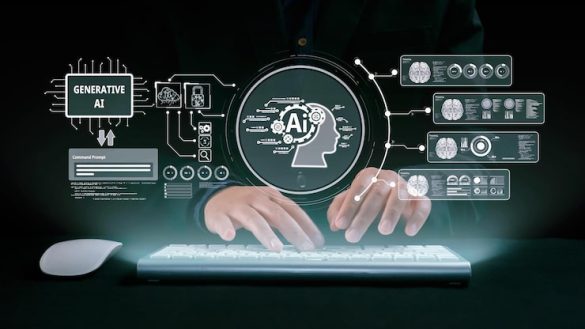Artificial Intelligence Tools are rapidly changing how we work, think, and collaborate. What was once futuristic is now an everyday part of professional life, helping individuals and businesses automate repetitive tasks, enhance productivity, and make smarter decisions. From virtual assistants that manage your schedule to analytics tools that predict market trends, AI is redefining efficiency in every field.
In modern workplaces, time is the most valuable asset. AI-driven systems allow professionals to spend less time on manual work and more on creative and strategic thinking. Whether you’re an entrepreneur, marketer, designer, or data analyst, understanding how to use Artificial Intelligence Tools can help you stay competitive and relevant in the evolving digital landscape.
How Artificial Intelligence Tools Are Shaping The Future Of Work
The adoption of Artificial Intelligence Tools is not just a technological upgrade—it’s a strategic shift. These tools have become integral to how organizations function, from streamlining communication to analyzing massive data sets in seconds.
AI’s primary advantage lies in its ability to learn from data and improve over time. For instance, AI-powered CRM systems like Salesforce Einstein analyze customer behavior to personalize marketing strategies, while tools like ChatGPT assist in generating high-quality written content efficiently.
By incorporating AI into daily workflows, professionals can make faster, data-driven decisions. This improves not just productivity but also accuracy, reducing the risk of human error that can cost businesses time and money.
Boosting Productivity With AI-Powered Assistants
One of the most noticeable impacts of Artificial Intelligence Tools is their ability to automate routine tasks. Virtual assistants like Google Assistant, Siri, and Microsoft’s Copilot can handle scheduling, reminders, and even email responses, freeing up valuable time for more complex tasks.
Imagine walking into your office with your day already planned, reports summarized, and your inbox organized—all handled by an AI system before you even start your morning coffee. This kind of intelligent automation allows professionals to focus on creative problem-solving rather than administrative overload.
AI assistants are now integrated into workplace tools like Slack and Notion, helping teams collaborate effortlessly. They can generate meeting notes, summarize discussions, and even suggest follow-up actions, ensuring nothing falls through the cracks.
Enhancing Communication And Collaboration
Clear communication is the backbone of successful teamwork, and Artificial Intelligence Tools are revolutionizing how teams connect. AI-based communication platforms analyze tone, language, and sentiment to improve how messages are delivered and received.
For example, tools like Grammarly and Jasper help refine written communication by suggesting tone adjustments, improving clarity, and enhancing overall professionalism. On the other hand, transcription tools like Otter.ai and Fireflies.ai convert meeting conversations into searchable text, making collaboration more efficient and transparent.
These innovations not only save time but also ensure that team communication remains inclusive and accessible, even across different languages and time zones. AI-driven translation tools are bridging gaps and fostering global collaboration in ways that were once unimaginable.
AI In Data Analysis And Business Decision-Making
In today’s competitive world, decisions need to be backed by solid data. This is where Artificial Intelligence Tools play a crucial role. They help professionals process large amounts of data, recognize patterns, and draw actionable insights in real-time.
Platforms like Tableau, Power BI, and Google Cloud AI empower organizations to transform raw data into interactive dashboards and predictive reports. Instead of spending hours manually analyzing spreadsheets, professionals can now visualize key performance indicators instantly.
By providing deep insights, AI tools enable companies to anticipate customer needs, detect fraud, optimize pricing, and predict market trends—all essential elements for business success.
Creative Applications Of AI In Modern Workplaces
While many associate AI with data and analytics, its creative potential is equally impressive. In marketing, Artificial Intelligence Tools like Canva Magic Studio and Adobe Firefly help design personalized visuals with minimal effort. Writers and content creators rely on AI-powered tools such as ChatGPT and Writesonic to brainstorm ideas, create copy, and even edit drafts.
AI has also transformed video and audio production. Tools like Descript allow users to edit videos simply by editing text, while Lumen5 automatically converts articles into engaging video content. These innovations make high-quality content creation accessible to individuals and small businesses without large creative teams.
By leveraging AI for creative tasks, professionals can achieve more in less time, maintaining both quality and originality.
AI And Remote Work Efficiency
The rise of remote work has made Artificial Intelligence Tools even more essential. They support seamless project management, monitoring, and communication across distributed teams.
Project management tools like Asana Intelligence and ClickUp AI analyze workloads and deadlines, suggesting ways to optimize team performance. Meanwhile, time-tracking applications powered by AI can identify productivity trends and recommend breaks or task adjustments to prevent burnout.
Remote work also benefits from AI-driven cybersecurity measures. AI-powered systems detect unusual login attempts and suspicious activity, keeping sensitive company information safe from digital threats. This ensures that remote teams can work securely from anywhere in the world.
AI In Customer Service And User Experience
Customer experience is a key differentiator for brands, and Artificial Intelligence Tools are elevating it to new heights. AI chatbots and voice assistants handle inquiries, provide instant responses, and offer round-the-clock support.
Platforms like Intercom, Drift, and Zendesk use AI to personalize customer interactions, improving satisfaction rates and reducing response times. These systems learn from each conversation, continually improving their ability to handle complex queries.
Beyond support, AI-driven analytics monitor customer journeys, helping businesses understand user behavior and predict future preferences. This data allows companies to create more personalized marketing campaigns and tailor their services to specific customer needs.
The Role Of AI In Workplace Learning And Skill Development
Continuous learning is essential in a fast-changing work environment. Artificial Intelligence Tools have made education and skill development more personalized and accessible.
AI-powered platforms like Coursera, LinkedIn Learning, and Duolingo use algorithms to track learner progress and recommend customized learning paths. These tools help employees stay updated with industry trends while maintaining flexibility in how they learn.
For instance, AI can assess a professional’s skill gaps and suggest courses or exercises tailored to their goals. This makes learning more efficient and directly applicable to their job requirements.
Employers also benefit, as they can use AI analytics to measure training effectiveness and identify areas for workforce improvement.
Challenges And Ethical Considerations Of AI In The Workplace
While Artificial Intelligence Tools bring immense benefits, they also raise concerns regarding data privacy, job displacement, and ethical use. It’s important to ensure that AI systems are transparent, fair, and used responsibly.
Professionals must remain aware of how their data is being collected and used. Organizations implementing AI must prioritize ethical AI frameworks, ensuring accountability and fairness in automated decision-making processes.
Rather than replacing humans, AI should be seen as a partner—enhancing human capabilities rather than eliminating them. By maintaining a balanced approach, we can harness AI’s power while preserving human creativity and empathy.
Creating A Smarter Future With AI
Adopting Artificial Intelligence Tools isn’t just about keeping up with trends—it’s about working smarter. AI empowers individuals and organizations to achieve greater efficiency, accuracy, and innovation.
The key lies in understanding which tools align best with your goals. Whether it’s automating tasks, enhancing creativity, or driving data-driven strategies, AI provides the foundation for a smarter, more agile future of work.
The workplace of tomorrow will be defined by those who can adapt, learn, and collaborate with intelligent systems. Those who embrace AI today will lead the transformation of industries tomorrow.
Read also:
teckjb com
kolkata knight riders vs royal challengers bengaluru match scorecard
clearskinstudy emails addresses
airtel merco
vmake apk mod
social media girl forum
social media girls forum


